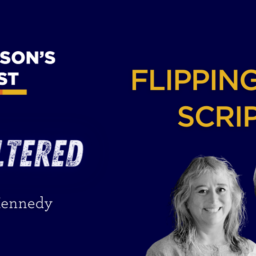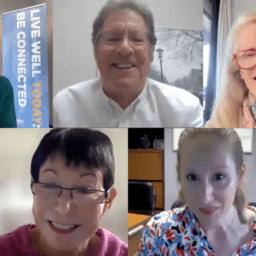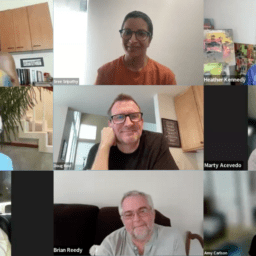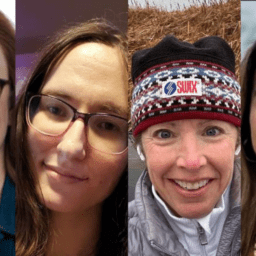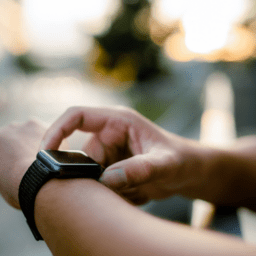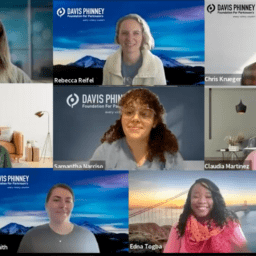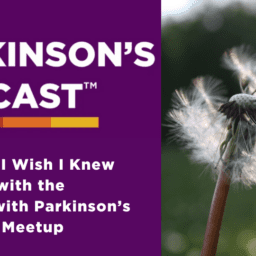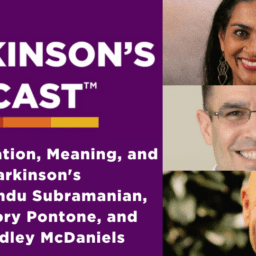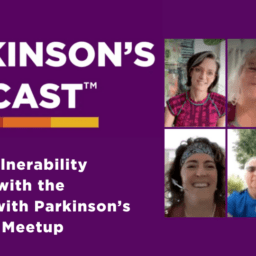episode summary
In this episode, panelists Juwairiya Syed, Bud Rockhill, Barb Ankenman, Mary Gail Anderson, John Paul Lederach, and Angela Robb discuss:
- Maintaining identity amidst caregiving
- The power of gratitude
- Communication with your person with Parkinson’s
- Being the care partner for a parent with Parkinson’s
- Involving others in the care partner experience
- Not feeling selfish about setting boundaries
- Caring for someone with dementia
- Getting paperwork in order
- The balance between overstepping and understepping when it comes to decision making as a care partner
- Balancing caregiving with having children
- Full-time care facilities
listen now
Read below for the transcript, or download here.
Jackie Hanson (Program Manager – Audio and Video Production, Davis Phinney Foundation):
Hello everyone and welcome to the Parkinson’s Podcast. This podcast is brought to you by the Davis Phinney Foundation and brings you experts from the around the country as well as additional educational and inspirational resources to help you live well today with Parkinson’s.
Welcome everybody, we’re so glad you’re here. My name is Jackie Hanson and I’m the Program Manager of Video and Audio Production here at the Foundation and I am so glad you’re with us listening today! If this is your first time joining us for this podcast, I’m very grateful you’ve found us and I want to encourage you to please feel free to reach out anytime to get in touch with us at blog@dpf.org. Again, that’s blog@dpf, which stands for Davis Phinney Foundation .org. And of course, for all you seasoned listeners, welcome back. We are also so very grateful you are here and finding value in this podcast and we always look forward to hearing from you as well. So, feel free to email us at anytime.
If you missed our episode last week, be sure and check it out. It was a discussion with panelists Wayne Gilbert, Robynn Moraites, Sarah Zenner, and Soania Mathur on how they handle the feeling of just wanting to “get away” from Parkinson’s. They discuss that while there is no such thing as quote on quote “getting away” from Parkinson’s they have found ways that help them remember that Parkinson’s is not all that they are and how to create moments that take the focus off of Parkinson’s. It really is a wonderful and inspiring conversation, and I really recommend you listen to it.
Starting this week, we are doing a mini two-episode series specifically geared for the Parkinson’s care partners. Today we are featuring a panel discussion between Juwairiya Syed, Bud Rockhill, Barb Ankenman, Mary Gail Anderson, John Paul Lederach, and Angela Robb. In the following conversation, they provide insight on a variety of things, including navigating the difficulties of communication and decision making as a care partner, the logistics of exploring full-time nursing facilities, caring for someone with dementia, how to keep your own identity outside of being a care partner, and much much more.
A reminder that all of the links and resources mentioned in this episode along with a video recording of the conversation can all be found on the accompanying blog post, which is linked to in the show notes of this episode. A quick note that this conversation was originally recorded as a part of a live Victory Summit event, so every now and then you will hear panelists mention the virtual chat and previous speakers. If you’re interested in exploring more conversations from this event, those will be linked to in the accompanying blog post as well.
So, without further ado, here is Polly Dawkins, executive director of the Davis Phinney Foundation who will be the moderator for this discussion.
Polly Dawkins (Executive Director, Davis Phinney Foundation):
And now it’s my pleasure to welcome our care partner. We’ve got a wonderful group of individuals who have been care partners, are care partners, and to lead us in a bit of a Q and A. I want to start off by asking our panelists first to introduce yourself and tell us where you’re calling in from. And then tell us a little bit about what your care partner role has been or was. So I’m going to go across my screen as I see you all, so Bud Rockhill. You’re the first person I see on my screen. Would you introduce yourself?
Bud Rockhill:
Morning Polly, morning, everybody. I’m Bud Rockhill. I’m in Golden, Colorado, and I was a long distance care partner for my mom who had Parkinson’s for 20 years.
Polly Dawkins:
Thank you. And John Paul Lederach.
John Paul Lederach:
Yeah. Hi everybody. Hi Polly. I’m calling in from Tucson. My name’s John Paul Lederach. And I’m a care partner for my wife, Wendy whose going into about the 14th year, since diagnosis.
Polly Dawkins:
Good to see you, Angela. Welcome.
Angela Robb:
Hi Polly good morning. I’m Angela Robb. I live in Fairfax, Virginia, and I am a care partner for my husband, Carl, who has young onset Parkinson’s for over 30 years. And we will celebrate our 25th wedding anniversary at the end of the month.
Polly Dawkins:
Congratulations, Barb.
Barb Ankenman:
Good morning. I am Barb Ankenman and I’m calling in from Burlington, Kentucky. That’s Northern Kentucky outside Cincinnati. I’m the care partner to my husband Dale. He was diagnosed 20 years ago at the age of 46. He had deep brain stimulation surgery about 11 years ago and we’re get through it all.
Polly Dawkins:
Thanks for being here. MaryGail.
MaryGail Anderson:
Hey, I’m MaryGail Anderson, just a little North of Nashville, Tennessee, as if you couldn’t tell with the accent. I actually had the privilege of being a care partner for my father for about 11 years, nine years, a little closer than not.
Polly Dawkins:
Wonderful. Well thank you all for being here today. Today’s going to be a conversation amongst ourselves and for those of you in the audience, feel free to ask our panelists questions. To start off, I thought we’d dig into this, this topic that Jessica also spoke about is how do you, especially for those of you who are spouses, how do you maintain your identity amidst caregiving, and go ahead and take yourself off mute and just let’s have a conversation here.
Barb Ankenman:
This is Barb. I find it just so important that I have a purpose and a relevancy that’s not connected to Parkinson’s whatsoever and the way I’ve been able to accomplish that is through volunteering. And I find volunteering gives me a chance of social interaction of helping others and really focuses me away from Parkinson’s or any of our challenges that we face. A lot of times this is something I can also do in conjunction with my husband. And that also gives him that purpose, that relevancy away from Parkinson’s also.
Polly Dawkins:
Yeah. And Barb and I are going to really dive into that topic this afternoon and a breakout session called how to step away from Parkinson’s. And we’re going to have a conversation and invite you all to talk a bit about strategies that you all use to step away from the day-to-day Parkinson’s. Angela or John Paul do you have thoughts on maintaining your own identity?
Angela Robb:
Go ahead John Paul.
John Paul Lederach:
Okay. Thanks. I wasn’t sure, I didn’t wanna interrupt you. I, you know, I think there are elements that are natural to particular life place that we’re at. I continue to work. I’m traveling a good bit less. We used to travel together, but that’s been more impacted, but my work connects me to a pretty wide global community where what I’m doing doesn’t connect necessarily, you know, directly to Parkinson’s. I think the harder piece is more the close friendships and the intimate you know circle friends that we have where Parkinson’s has impacted to some degree, the amount of hosting and other things that Wendy would have done very naturally over the years. And so how to find ways that the constant question is not how’s Wendy doing, but that you’ve got conversations that don’t start with that question, always that don’t have to be exclusively about what’s happening in that.
And that’s taken some intentionality and especially where we’re navigating kind of in life cycles, in our, you know, just proximate to a full retirement and looking at locations where we’re going to plan to be more permanently, that opens up the possibility for new friends, but it also makes it requires you to be more intentional about reaching out. And I’ve had to do that independent of whether we do it together. Now as a couple, we always did a lot of stuff together. So it’s not, it’s kind of not an easy dance in some ways I’ll be honest, because but you have to be, I think find ways that you just say, you know, I need this I’m going to reach out, I’m going to go have coffee with somebody I haven’t met yet. We’re going to try and make that maybe once a month or something and that’s okay. And those things don’t have to circle exclusively around how significant Parkinson’s actually is in our life.
Polly Dawkins:
Angela, where are you gonna comment?
Angela Robb:
I was gonna chime in a little bit with what John Paul said. You know, yeah, it does take a lot of intention to make sure that I have a separation. I’m very intertwined with the Parkinson’s community and my husband and I work together. We live together and have a, you know, our marriage together. So I really enjoy those times where I can get together with my friends and go have coffee. It’s been difficult with COVID. I enjoyed going to a gym at least four or five times a week, giving myself an hour away from the phone, the internet, and the husband. But you know, honestly, we’ve made it work by getting out more together and although I’ve missed my friends, you know, I still feel that I do have a separate identity. I guess I’m just more intertwined and I’m okay with that. Because he is my partner and my best friend.
Polly Dawkins:
That’s lovely. I want to ask a question from the audience, and this is for all five of you. A person with Parkinson’s, who’s watching, asks the question, what can the person with Parkinson’s do to make your roles easier or ease the burden on you?
Angela Robb:
I guess I’ll go Polly. I’m the only one un-muted. So I’m dipping my toe in. Communication really. The more that we communicate with each other and talk about how both of ourselves are doing, I think Jessica made a great point. I heard her comment where a couple actually sets time aside to sit down and have no devices and have an eye-to-eye contact with each other. I think that that’s a fabulous suggestion that I actually will do myself, but communication really is the key. The more that we’re in touch with each other and what’s happening, I think makes it easier for me to make decisions, to check with him, to, you know, figure out our direction and, you know, can we go out and do that errand right now or do we wait a little bit, but communication, I think is really the key for us.
Barb Ankenman:
I would agree Angela, that communication is big. And a part of that also is for the person with Parkinson’s to be encouraging and supportive of other parts of your life. And to encourage that, and also to recognize that as Jessica had said before it’s a two-way street to recognize that it’s tough for you too, and to give you permission to not always feel great about things either.
MaryGail Anderson:
Barb, that’s what I was going to touch on, was just gonna say, if there’s something that could have been given to me by my father, it would be grace, because it was definitely a learning curve. And, you know, I didn’t know how he felt and unless he was very honest, sorry, something’s happening in the background, unless he was very honest with how he felt that day or how medication had made him feel, or, you know, I wouldn’t know, because I am not the one who physically had Parkinson’s. So I think grace, and then a lot of honesty.
John Paul Lederach:
I’d just concur Polly just a quick note that I have found personally that sometimes it’s really the small things that make a difference. So, you know, kind of a simple gratitude practice, just how much it means to me when Wendy says that she appreciates something or that she knows that it’s hard and how much she appreciates, I think on her end, a recognition that, you know, a small thing that she did, that was a big accomplishment for the day is recognized. And just to say it, so there’s something about gratitude that combines, I don’t know what it is, something about recognition and appreciation, but to express it and not to kind of keep silent about it. It has been, I think the places where I’ve felt the most I guess, combinations of empowered and able to keep going.
Polly Dawkins:
What does your gratitude practice look like if you don’t mind sharing?
John Paul Lederach:
Well, I have a whole range of practices, but it’s the, in this particular instance, it’s been trying better to say the times that I’m grateful for things that were done, knowing how hard those were to get accomplished, whether it was like last night, you know, Wendy cooked a meal and it was, that doesn’t always happen depending on the energy of the day. And you know, that that was wow. That was really good. And so it’s more, I may come back to this later, but it’s more how you are present at a given moment, but to find ways of expressing that and how easy it is to let a thousand of those slide every day that you don’t take note of. And that I think is what has been for me at least more about.
Angela Robb:
Yeah, I think John Paul’s right. You can get, there are times where I know I get really busy during the day doing things and I’m not full of maybe gratitude is just last on the list, but I do the same thing. I really try to acknowledge as Davis says all the time, the small victories. And I always try to make sure the least, I have an intentional thank you at the end of the day and nighttime to Carl, to thank him for anything that he’s done during the day. Cause I think that’s important. I will also make a shout out for laughter. We do laugh sometimes at the smallest craziest things. It does make, it makes things easier sometimes. So we try to mark those moments as well.
Polly Dawkins:
Bud, you were a care partner to your mom from a distance. What would have been easier for you or what would have helped you that she could have done from a distance for you to make your job as a care partner a little bit easier?
Bud Rockhill:
I think the only thing there would be the communications and, you know, I think you’ve touched on it here with the honesty and the communications you know, knowing how she really is feeling and whether it’s, how are these drugs doing? Cause I think part of the role from a distance, you know, which is certainly not nearly as complex as the other panelists here you know, is what can you do? And I think it’s being an advocate. And so that role, like I have a sister who lives close to where my mom was, and I was the long distance one. So for me, you know, a couple of things were, and this isn’t like directly answering your question about what could my mom could have done. Cause I think that starts with the communication piece, but related to that was having the, you know, being very clear on what she wanted.
And so the documentation piece, again, especially from a distance, you know, the power of attorney, medical power of attorney, the HIPAA disclosure, you know, what does she want? And, you know, those conversations are not always natural, but you know, for me, positioning it as all I want to do is fulfill your wishes and make sure that, you know, things are taken care of in the way that you want. And then we were able to do that before things got worse. So I think it was comforting. And then I think this being an advocate piece, so I would fly in for the more important appointments with a neurologist so that she had somebody there taking notes so that I was clear on what was really supposed to happen because sometimes in the moment it can be information overload for the patient. And so, you know, my role there to sort of filter through it and be able to review it with her afterwards.
Okay, this is what he said. And you know, to that your resource manual is really, really helpful for her, planning for appointments and then recording it afterwards and gave her a sense of being involved in her own care and wellbeing so that we walk that fine line between role reversal. And then, you know, I wouldn’t call it the gratitude piece, but the being the cheerleader, you know, kind of like what John Paul was just saying is recognizing accomplishments, even from far away, you know, hey, this is what she did in physical therapy today. Or I was able to walk 50 steps instead of 30 steps and just really encouraging that. And it, you know, it was good for our relationship and I think it certainly helped her because the day-to-day existence is pretty challenging.
Polly Dawkins:
Yeah. Both MaryGail and Bud here are children of people with Parkinson’s. And I wonder if you all could speak about how do you start to involve other people in the care partner experience that aren’t just you as spouses, whether it’s your children, if you have children or it’s other friends, how do you start to bring in resources so that you, as the primary care partner don’t have to do it all?
MaryGail Anderson:
Sorry. For me, I was able to use the contacts that I had through my association with health care. And I just made sure that everyone understood what I was going through with caring for my father. And I was eager and very hungry for all new information because I knew if I had gotten information, then I could deliver it to other people as well, you know, to educate them. So they didn’t have to work so hard, but any of the information that I received I had noticed as we got a little more advanced into my dad’s disease that I had to really be on top of it. And if I weren’t on top of it, then there were a lot of problems, and I was playing catch up at that point. So I think with getting that education and getting the right training involving age, discipline, and health care, for instance like I never even thought that I would need in the beginning speech therapy, occupational therapy you know, physical therapy, that was kind of a given.
And then we had multiple doctor’s appointments, started out with a primary care who was at least knowledgeable enough to say, hey, you need senior ology, specifically movement disorder. So, you know, I think getting the right people involved so that I didn’t feel like I was so stressed and anxious about what’s the next step in the healthcare, was the first step of the health care. And then my dad also had confidence in knowing that, you know, I would go after that information for him and that he would have the right people caring for him. And that also allowed whenever we had that under control, it allowed for me to be able to be with my family, although I would have to be with him a lot and very often, but I could have my family there with me. And I had three daughters, I have three daughters and my husband, but, you know, being able to involve him as much as possible in holidays.
And, you know, if my girls had games, I wanted to be able to take care of him and then go to be with them because you still have a lot of balance in that. So I think, you know, just getting everyone involved that you can so that you have that core group that can help you with care and support. That was the biggest thing. And I think that’s a very good key point for this session too, about just being supported and being cheered on, as you all have said, but once we were able to do that, there was good balance and my dad had confidence and that made me feel better about caring for him too.
Polly Dawkins:
Yeah. Thanks, MaryGail. I just really quickly, I want to invite our other panelist to the discussion. Juwairiya, would you say hello and yourself and tell us what your care prtner role was?
Juwairiya Syed:
Absolutely. My father had Parkinson’s he passed away this past May from unrelated to Parkinson’s, but he was officially diagnosed in 2018. But we suspect his diagnosis should have come a lot earlier. And you know, this was especially the challenge, the biggest challenge with it was not knowing it was Parkinson’s for a very long time. And his parents, my father’s parents had died when he was quite young. And from what we have heard in the story, we also suspect that his mother also had Parkinson’s and I don’t know the research, I’ve done a lot of my own research, my amateur research, but about in terms of having a genetic component for Parkinson’s.
But we didn’t have a lot of time with him with the diagnosis, but when we first got the diagnosis and even the months leading up to the diagnosis and a month after you know, we did a lot of research, my family and I, and I did a lot of research and we also had limited means, so we weren’t rolling in cash as I wish we were for all of us. So we did a lot of research specific to how we can get him resources through Medicare, which is what we qualified for. And that was, that was tough. That was a big challenge. So yeah, I’m looking in the chat communication is a challenge. It was, it was a big one. I mean, he’s a, he comes from a very specific generation and demographic of men.
My dad, he came from south Asian men in south Asian community. So therapy wasn’t exactly an option. Always. It wasn’t always something he was open to, but it was really important for me and my family. If he wasn’t willing to do it, we had to figure out how to do it for ourselves, at least. And the biggest thing that was really important to remember is that we’re not being selfish in that, right? In setting certain communicative boundaries, even when he’s getting really upset and he’s frustrated, or he hasn’t, you know, properly taken his medication for his day on the right time. And the time that it takes to, those months where we’re figuring out which medication dosage works and how much works and how it affects his mood to remember, to not take it personally for ourselves. And that was a big one that was really important for us in our family. And he did also have towards the end Parkinson’s with dementia which, you know, can only make communication a little bit more difficult and challenging. So I mean, I’ll try to offer as much of that insight on that as I can.
Polly Dawkins:
That’s a question that is coming up quite a bit in the chat. And some of you have had experience, I know MaryGail, particularly MaryGail is also a care partner to her mom who has Alzheimer’s. So for those of you who have had experience with a person with Parkinson’s with, or I guess Alzheimer’s for MaryGail with dementia, how do you, how can a care partner navigate the journey with somebody who has Parkinson’s disease dementia, as well as all of the other complications of Parkinson’s?
Juwairiya Syed:
Yeah, I’m just going to jump in on this one. The first, and I think the most important thing for us as a family, especially because my father, the dynamic was that he was the head of the family, logistics, putting, you know, the communication and emotional side of the conversation to the side for a second. The logistics of getting paperwork in order was really, really, really important and helpful, getting, and it’s really tough because the tests and the diagnosis tests for Parkinson’s patients in general is difficult along with the dementia part added is also tough, but getting that diagnosis on paper from a medical professional, from a doctor, getting those tests done, and then getting, you know, medical power of attorney, legal power of attorney, all of those documents in line, the minute you suspect that there’s dementia, it is so key and clutch and really important for having a smooth journey. So that is something that was really important for us and a big hurdle we needed to get done first.
Polly Dawkins:
Yeah. And, Bud has written a whole piece in our, Every Victory Counts manual about getting, essentially getting your ducks in a row and what you need to do to be prepared well before you need it, Bud, do you have any thoughts on that? And we’re gonna have a breakout session this afternoon specifically on this topic.
Bud Rockhill:
No, I think I mentioned it before, but to that comment just made, I certainly would not, I think you should just do it period, like when people are in good health, if possible, but in this case, given the potential progression from Parkinson’s to dementia like do it, and I don’t mean this in just Parkinson’s, but to do it when it’s Parkinson’s because the dementia piece adds a whole different level of complexity to it. And so, and again, you know, the conversation, which is not a natural conversation is just about, I wanna make sure, you know, be the kid, you know, I want to make sure I’m doing things the way you want them done. And so it’s not like trying to position it as well when something bad happens, it’s really just, you know, being a faithful implementer of what the person wants. And so it, actually, we had some really good conversations about it, and it set the stage. Hey Polly, are we going to come back to the facilities question? Because somebody just, oh, you know what? It came up a minute ago on the timeliness of medication and there’s a whole different challenge if somebody’s in a facility. So if that comes back, I just…
Polly Dawkins:
Yeah, let’s circle back to that. I’ve got a chat document over here. I’m keeping track of those. So let’s come back to that. I wanted to, you know, you talk about making decisions and making tough decisions. I want to ask the folks here who are spouses of a person with Parkinson’s about that partnership in making decisions and how do you maintain a partnership with easy decisions and then with hard decisions? Do you have any experience or thoughts on that, John Paul or Angela or Barb?
Angela Robb:
Well I just put it in the chat Polly, but we just lost a couple of people in our lives in the last few months that were really close to us. And we kind of saw some of the decisions that were made. We weren’t the ones making the decisions, but we were kind of to a step or two back from the people who were, and it kind of elevated that issue. So we’ve had a lot of conversations, especially as I put in the chat we don’t have children, so we really do need to step up our game in specifying, you know, what kind of measures do we want to have taken? And then how do we proceed with that? And I think it’s extremely important. And you know, I think during COVID it kind of came up and then we put it aside, but now it’s back in the forefront.
So yeah, making that time, I think is vitally important and although we communicate all the time for everything else, you know, it just, once again, sitting down being quiet and with paper and trying to make sure that we both know what the other person wants. So, yeah. And I also feel additional responsibility to make sure that, you know, there’s some connections for care that he might need if I were to pre, if there is a serious health issue on my part, you know, is there people in place that would help him initially to get through the daily activities that I probably, that I cover right now. So.
John Paul Lederach:
I don’t know that I have brilliant insight on this because it’s something that I struggled a lot with. Let me just put it confessionally. This is hard because in Wendy’s case there, you know, obviously there’s some cognitive declines, it’s harder to get words out, sometimes, put thoughts together to concentrate on certain things, but it’s not at that end where it’s headed into, you know, any kind of dementia. So you’re in this kind of challenging gray area and it’s like emergent learning. And the hardest things are actually, I don’t, it’s not easy to know to distinguish between small and big decisions. It’s not easy to know when I’ve overstepped and taken away the opportunity for her to continue to do something that could have been done and just because it’d be quicker and easier, I, you know, moved ahead and did it compared to like really big ones, like where are we going to live?
And when are we going to retire? You know, me in particular, Wendy’s done it for a long ways back, but those things are not conversations that are like, once it’s over, you just keep you circle back around them quite often. And I find it to be something that we’re still learning a lot about. I think obviously communication is important, but I think behind the communication, what becomes significant is to have enough presence of mind to recognize when something has been under or overstepped. And that that can then be talked about with greater specificity because that gray area just keeps everything kind of ambiguous as to how you might want to take it on. And I think expanding into the children, it’s also a kind of an intriguing, ongoing process of how to engage the people that are really significant in your life.
In our case, our children and grandchildren, how, and when to have those conversations, when to have them you know, it comes up naturally in one-to-one walks that you might have with one of your kids. And then there’s questions of whether you’ve overstepped in what you’ve said, and, or, you know, there’s a whole range of things and what you try to hold, you know, having the opportunity to ask questions about wider family responsibility is not easy because you know, lives are busy with young kids and whatnot. So I find it’s really, you know a learning curve kind of assumes that we have this notion that we’re going to arrive at the mountain top of clarity. And I don’t think that there is such thing as a mountain path of clarity. It’s like every day you’re learning. And so when I figure out a way to be patient with that learning and to recognize that you’re not going to be perfect is maybe the most important thing that we’ve figured out. We’re going to choose to be ourselves and imperfect with each other but honest.
Angela Robb:
I agree with that, John Paul. Yeah. You have to give yourself, there’s no such thing as a perfect answer. And it, yeah. And there are times where I, we both apologize to each other for overstepping each other and I sometimes have this discussion, is that Parkinson’s or is it just marriage? I don’t know. It might be a marriage, but it could be Parkinson’s.
Barb Ankenman:
Yeah. I, that really resonated with me also about the overstepping or under stepping and you know, my husband does not have dementia. He is not at that point. Hopefully won’t be, but he has Parkinson’s. And I think when we’re making decisions and having discussions like that, we have to remember that they’re a person, that we don’t define them by their Parkinson’s. And what they have to say is, is vitally important. I’m not in charge of everything. You know, we’re both in everything together and it’s not just up to me. So it’s treating him with that respect and dignity, he’s as valuable as a person and his input is as valuable as mine.
Polly Dawkins:
Such important comments. Yeah. I love the, is this Parkinson’s or just marriage, Angela, especially Angela, your husband has had Parkinson’s the whole time you’ve been married. So.
Angela Robb:
Yeah. So I don’t know Carl without Parkinson’s. So I, you know, and I, you know, I think maybe couples who don’t have chronic conditions have the same questions, like, you know, or different chronic conditions, maybe they have the same conversations, but yeah, I just try to approach it sometimes I don’t use the filter of Parkinson’s. I just say it’s husband and wife and chalk it up to that.
Polly Dawkins:
Yeah. I want to ask another question about husband and wife and then let’s shift to the topic of care facilities that Bud brought up, cause I know Bud and Mary Gail have some deep experience in that area. One of the questions is for those of you who are spouses, how do you balance your relationship with your person with Parkinson’s while, if you have, while raising children or teenagers if you have children, how do you do that?
Barb Ankenman:
Flexibility. I might, my children are young adults now, but certainly when Dale was first diagnosed, they were preteenagers and you know, it’s flexibility. And with Parkinson’s being so unpredictable, you don’t know, I’m sure all of you have experienced, you don’t know what each day is going to bring. Some days you can take that three-mile hike through the woods and other days, you know, it’s a challenge to get from room to room. You know, I think we both recognize that we are individuals, and we are people and we do have other responsibilities. Life is more than Parkinson’s and you just, I’m not sure what else to say on that just being flexible each day.
John Paul Lederach:
Yeah I, a hundred percent agree with that. In fact, one, I think you know, we’re at sort of that 14 year location, which means a decade and a half more or less, and you suddenly realize that the time thing is so paradoxical this, the slow progression in some ways, but are you looking at it in reference to decades or you’re looking at it in reference to the hour to hour is part of your daily reality? And for me, I think the question of balance really, I mean, the main thing was that I had to realize and it took a few years to get there that the space to really have a daily set of things that were significant to me that brought me joy what the earlier session was talking about. And but also the brought me to, I refer to, I mean, I tend in the direction of walking every morning and evening and I write haiku poetry.
Haiku has been very significant for a lot of reasons. It’s a very simple, a very simple practice, but it’s very much moment based. It’s about what you experienced in a given moment, what you, how nature touches you, how you touch it back in some ways. And those small things had to be daily, because the ability to take note of what the moment meant might be precisely I think what Barb was saying that yesterday, and maybe next week, a bike ride will be possible, today, barely getting out of the bedroom and not feeling like anything is functioning in the digestive system means everything’s thrown up completely. And you’re, how you’re present to that for me was where I had to place it. So I refer to it as my daily dose of vitamin “awe” that I have to find a way for something every day, every minute, every second, to have a capacity to realize that life is ultimately an extraordinary gift. This relationship is the most significant thing in my life and not to lose track that because things are going haywire in one hour that that means the whole week’s gone. This is the part that’s so weird about it. So I try to figure that out. You know, I try to have practices that are those kinds of things that I do on a daily basis, because you, can’t kind of be in a position that it’s going to get better next week, or it’s going to get better next year. It’s about the fact that you’re living with it as it is at this moment. And that’s very unpredictable. So how do you live well in unpredictability? That’s the challenge.
Polly Dawkins:
I see so many heads nodding here, and I can hear it in the audience as well. Super important. Any other comments before we do a segue into this topic of care facilities, any moments of vitamin “awe” that you want to share?
Angela Robb:
Mindfulness? I think it’s a lot John Paul, that it’s a lot of mindfulness, you know, meeting each moment as it comes. And that’s always an ongoing practice along with patience. And I just read Tina Hahn wrote in his one book about lettuce and he talks about the lettuce issue and how that you know, do you yell at the lettuce if it doesn’t grow? No, of course not. You don’t yell at the lettuce if it doesn’t grow, you try to nurture it and hopefully give it what it needs to grow. And then we need to do the same thing for ourselves and our loved ones in our life too. So that’s really resonated with me in the recent days. So.
Polly Dawkins:
A question from the audience, a person who is curious about care facilities, and especially if you are you don’t have children. How do you assess are there care facilities that are particularly good for people with Parkinson’s? How do you find a place if you, as the child or as the care partner can’t physically take care of your person with Parkinson’s, MaryGail, I know you worked with your dad in facilities, and I know Bud, you’ve worked to find places for your mom. Tell us a little bit about that journey and how you assess and how you find the place.
Bud Rockhill:
MaryGail, why don’t you go first, then I’ll jump in unless you want me to go first?
MaryGail Anderson:
Well you go first Bud, you go first.
Bud Rockhill:
I don’t know. So this goes back like seven years, I think when we had to make the decision to put my mom into a facility instead of continuing independent living. And so I don’t know if there’s many that actually specialize in Parkinson’s somebody else could weigh in on that. So for us, it was like anything else doing the online research, getting information from like the county aging resource, and then narrowing it down, doing visits, asking the question, do you have experience with residents who have Parkinson’s and then doing site visits, meeting people, and then the best technique on that one, just the facility visit was after the official quote tour was over, was hanging out for a little while. And just going up to people randomly, like looking for family members who were visiting somebody who lived there and just saying, hey, excuse me, you know, my mom’s thinking of living here.
Could I talk to you for a minute? And that way you got, I found that to be pretty helpful on both sides and you got a lot more color commentary on, you know, the people are great, but the food’s terrible or whatever it was. You just, you just sort of got a sense of the feel of the place, you know? So that’s the, you know, and we got really lucky, frankly. But I do think asking about their experience with PT or with Parkinson’s and then do their physical therapists have experience with people with Parkinson’s and just trying to, and then like so many things in life it’s a little bit of a gut feel. And how do you feel when you’re walking around? You know, and how does the staff seem, do the staff all seem like they hate it there or do they seem like they’re, you know, they’re pretty good knowing how hard they work. So yeah. And then why don’t we flip to MaryGail and then I can come back. I do have some comments just on the once somebody is living there part.
MaryGail Anderson:
Well, so I had the fortune, or I guess misfortune, probably, you know, sometimes you have too much knowledge about something and that can be scary, but having been in the medical field, I knew, you know, what really happened. And I actually left my career at the hospital, and I went and I started a program in a facility because I knew that my dad was a frequent flyer in and out, in and out. And that was a rehab facility. So I knew because he would do rehab. I thought, you know, the only way to really beat ‘em is just to join ‘em. So that’s kind of what I looked at that for, but we did take him from home where I did initially care for him at home, and with the balance of trying to have a job and raise my family.
And he lived further away. We just had transitioned. He was not trustworthy. He definitely had an opinion. So, and it’s also about meshing those you know, how someone is, you know, like is his personality going to go well with someone else, you know, but going in and just exactly as Bud said, you know, is the staff happy? One of the questions that I asked was, what’s your turnover? How much do you pay your people? You know, are they going to be looking for another job? And then I would always, when we would decide, and my dad was definitely a part of that decision-making if he would go in if they didn’t offer to let him try their food, we weren’t going to go there because food was very important to him. You know, if you didn’t have food with your medicine, none of it was going to work anyways.
So it was, it was really the things, those little details, but there were so many of them, and as you progress with his disease, there were even more things so in the beginning, it was about the aesthetics and the people and the food. And then maybe the next time that we had to make a move, it was all of those things and then is there enough staff in this building? You know? And then the next time it was all of that and then, you know, do they understand what Parkinson’s is? And so to address what someone had asked about, are there facilities specific or who are very well versed in Parkinson’s disease. Through the experiences that we had, I did learn that there are a couple in the country and we’re on the east Eastern side of the country. So I know that there were a couple close to me, but it wasn’t close enough, and I wasn’t going to drop my baby off without being able to make sure he was okay.
So you know, do some good research for that. But the biggest thing that I saw was that the people who were taking care of my dad, they just lacked the education of what is it that he needs. And honestly, once I just told them what he needed and I befriended them and yeah, I would take coffee and say whatever they wanted, I would take it, you know, because they knew I’m going to be there. You gotta be present. And even like with Bud, with having to be far away, you know, from his mom, but that constant, that phone call, they know you’re going to call, but also would mix it up. I wouldn’t do it the same time every day, because I didn’t want the Sunday school answer. I wanted to get what’s happening, what’s happening right now. But something that I learned and this was after I met Polly and I learned about the Davis Phinney Foundation that Every Victory Counts manual is just, it’s like the Bible.
I mean, you take that and you can take somebody who knows absolutely nothing about anyone with Parkinson’s and they even taught, you know, it addresses caregiver needs really in the people, they work in those facilities. A lot of times they’re burned out. They don’t, you know, they’re tired. They don’t understand how to care for someone and not become just exhausted or you know, you gotta to take care of yourself. And then just the little things and allowing for my dad with Parkinson’s allowing for him to still do as much decision making as he wanted to. Do you, Mr. Chrissy, would you like to go from the dining room back to the activity room? Yes. Even whenever he was in a wheelchair, he could peddle himself and if he didn’t use it, it was lose it. So it was a lot of encouraging. Let him do it, you know, encourage him to do it. And I think you just have to find people who are willing to be really good cheerleaders, but you gotta keep your eye on them. For sure. Alright Bud.
Polly Dawkins:
And then we gotta close with Bud here.
Bud Rockhill:
I mean that’s it. Three things. One, what you said, the appreciation of staff, they have an unbelievably hard job. And so literally I would bring cookies, I’d bring coffee and bagels. I would do what you said, I’d mix up the time. So I made sure I brought something for the night staff as well as the morning. And so I think it helped the care, but it set the stage too, for me to be able to do what you said about calling. Like, I wasn’t the jerk relative calling. I actually cared and I was nice to the staff. Second, it came up earlier. Biggest challenge. I found timeliness of medication because I think for other meds, like an antibiotic, you know, typically you got a two-hour window. This was my biggest thing. The education piece, like, no, I’m sorry, you don’t have a two-hour window. You got like maybe 15 minutes.
And so to their credit, you know, after a while and me being nicely assertive you know, they did set up some educational seminars for their staff. Like, you know, this isn’t me just being a pain. This is important. You know? And then I think the third thing is the reality, as I understand, that a lot of living facilities, is the physician on premises is not actually an employee of the facility. It’s a contracted service and they frequently will not have a physician who has expertise in Parkinson’s. And so finding somebody in the surrounding community who is a movement disorder specialist, and this, I learned through Davis Phinney Foundation, that was a game changer. Once we went from, I don’t mean this bad about general neurologists, but when we, once we went from general neurologist to movement disorder specialist, the care level and the prescription, and the willingness to play around with the timing of the meds improve dramatically.
Jackie Hanson:
A big thank you to our panelists today, Juwairiya Syed, Bud Rockhill, Barb Ankenman, Mary Gail Anderson, John Paul Lederach, and Angela Robb for their time and participation in this conversation. We so appreciate them and their honesty and wisdom, and we hope that you all out there found some value in this conversation.
Last but not least, please remember that this is just one of the many free offerings from the Davis Phinney Foundation. Not only do we have countless additional resources to help you live well with Parkinson’s through our blog, YouTube channel, live events, and more, but we also have ambassadors all around the country ready to help YOU. These are people with Parkinson’s, care partners for people with Parkinson’s, and medical professionals, ready to help guide you through the complexities of this diagnosis.
With that, I want to say thank you everyone so much for being here, and we will see you next week.
For the video recording of this episode and others from the Victory Summit® Event, click here.
mentioned resources
more from the davis Phinney foundation
Related Resources
- Medicare and Parkinson’s
- Find many resources specifically for care partners on the Care Partner Topic Page
Additional Offerings from the Davis Phinney Foundation
- The Every Victory Counts® Manual: a free comprehensive resource on Parkinson’s and how to live well with it
- Live Webinar Events and Series
- The Victory Summit® Virtual Events
Listen & Subscribe
Apple Podcasts | Stitcher | SPOTIFY
If you enjoy this podcast, please help us out by leaving a comment, giving us 4 stars, and subscribing! We love hearing from our community and your comments and reviews will help us improve the show and reach even more people with Parkinson’s.
contact us
Contact us anytime at blog@dpf.org





